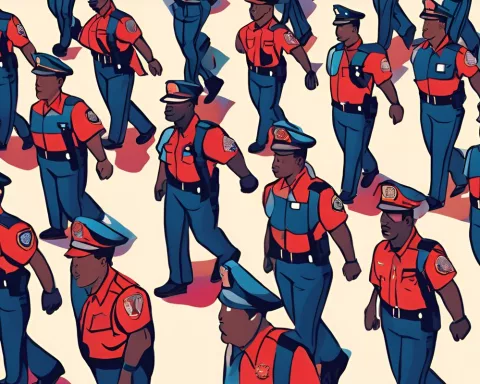The Health Portfolio Committee of South Africa organized three public hearings on the Tobacco Products and Electronic Delivery Systems Control Bill in Gauteng which saw a wide range of opinions, including disputes over the Bill’s introduction, concerns about its impact on small businesses, and debates about its potential effect on South Africa’s financial health. The proponents of the Bill advocated for plain packaging and the prohibition of tobacco sales through vending machines. The public hearings in Gauteng were a reflection of the people’s determination and the government’s dedication to hearing their voices.
Unfolding Public Sentiments on the Tobacco Products Bill: Insights from Gauteng Hearings
The First Public Hearings in Gauteng
The Health Portfolio Committee of South Africa organized three public hearings on the Tobacco Products and Electronic Delivery Systems Control Bill in Gauteng. The hearings witnessed a wide range of opinions, including disputes over the Bill’s introduction, concerns about its impact on small businesses, and debates about its potential effect on South Africa’s financial health. Proponents of the Bill argued for plain packaging and the prohibition of tobacco sales through vending machines.
First Public Hearings in Gauteng – A Mixed Bag of Reactions and Controversies
The Health Portfolio Committee of South Africa, on 27th November 2023, adeptly hosted three pivotal public hearings on the Tobacco Products and Electronic Delivery Systems Control Bill in Gauteng. The hearings witnessed a spectrum of differing opinions from the inhabitants of the Tshwane Metropolitan Municipality.
The committee’s engagement with the public did not proceed without hiccups and disputes. A contentious point was raised when some attendees claimed deliberate exclusion from the hearing due to their resistance to the Bill. The committee, in response, denied these allegations firmly, advocating that they had been promoting public involvement since the inception of these hearings. They stressed that they had fostered an environment conducive for meaningful public participation.
A pressing issue for the committee was the venue’s capacity in Tshwane, which could only hold up to 250 attendees. To tackle this, the committee presented forms for written submissions for those who couldn’t make it, assuring the equivalency of these written submissions to oral presentations. Moreover, representatives of groups unable to gain entry were allowed to express their objections to the Bill.
A Tapestry of Opinions – Public Voices and Concerns
The hearings witnessed a wide range of opinions. One group of residents disputed the Bill’s introduction, arguing that defining nicotine as a toxin was incorrect. They recognized nicotine’s addictive nature but campaigned for a clear differentiation between electronic delivery systems and combustible cigarettes in the Bill’s wording.
Micro-enterprises also shared their concerns about the Bill. They were worried that if enacted, the Bill might turn their businesses illegal, jeopardizing their livelihoods and their dependents. Additionally, these traders cautioned about possible socio-economic repercussions, such as an increase in poverty following the shutting down of small businesses.
A prominent issue raised was the Bill’s potential effect on South Africa’s financial health, considering the tobacco industry’s substantial contribution to the country’s tax revenue. Attendees suggested that the Bill’s enforcement could unintentionally boost the illegal cigarette market, thereby diminishing the country’s revenue base. As a result, they urged the government to develop strategies to tackle the illicit cigarette trade.
Those opposing the Bill emphasized the need for public awareness about the perils of tobacco consumption. They pointed out lapses in enforcement mechanisms to ensure the implementation of the Bill.
Proponents of the Bill – Advocacy and Support
In contrast, supporters of the Bill argued for plain packaging to discourage impulsive purchases. They also endorsed the concept of using graphic images on the packaging to highlight the dangers of smoking. In addition, they supported the proposal to prohibit the sale of tobacco products through vending machines.
The Bill’s advocates expressed optimism that it would protect non-smokers from secondhand smoke exposure. They are eagerly anticipating the continuation of the public hearing in KwaZulu-Natal, scheduled for January next year.
The Tobacco Products Bill is a progressive legislative proposition aimed at enhancing public health measures, aligning South African tobacco control law with the World Health Organization Framework Convention, and repealing the Tobacco Control Act, 1993. The Bill encompasses a host of changes, including declaring certain areas as 100% smoke-free, banning cigarette sales through vending machines, and introducing plain packaging with graphic health warnings and pictorials. It also proposes banning display at points-of-sale and regulating electronic nicotine and non-nicotine delivery systems.
These public hearings in Gauteng were not merely an exercise in democracy but a reflection of the people’s determination and the government’s dedication to hearing their voices. The reverberations from these hearings will certainly shape the future trajectory of tobacco control in South Africa.
1. What was the purpose of the public hearings on the Tobacco Products Bill in Gauteng?
The public hearings on the Tobacco Products Bill in Gauteng were organized by the Health Portfolio Committee of South Africa to hear a wide range of opinions, concerns, and debates about the potential impact of the Bill on South Africa’s financial health, small businesses, and the introduction of plain packaging and the prohibition of tobacco sales through vending machines.
2. What were some contentious points raised during the public hearings?
Some contentious points raised during the public hearings included disputes over the Bill’s introduction, concerns about its impact on small businesses, and debates about its potential effect on South Africa’s financial health. Additionally, some attendees claimed deliberate exclusion from the hearing due to their resistance to the Bill, but the committee denied these allegations.
3. What were the concerns of micro-enterprises regarding the Bill?
Micro-enterprises were concerned that if enacted, the Bill might turn their businesses illegal, jeopardizing their livelihoods and their dependents. Additionally, these traders cautioned about possible socio-economic repercussions, such as an increase in poverty following the shutting down of small businesses.
4. What proposals did the advocates of the Bill support?
Supporters of the Bill advocated for plain packaging to discourage impulsive purchases, the use of graphic images on the packaging to highlight the dangers of smoking, and the proposal to prohibit the sale of tobacco products through vending machines. They expressed optimism that it would protect non-smokers from secondhand smoke exposure.
5. What changes does the Tobacco Products Bill encompass?
The Tobacco Products Bill is a progressive legislative proposition aimed at enhancing public health measures, aligning South African tobacco control law with the World Health Organization Framework Convention, and repealing the Tobacco Control Act, 1993. The Bill encompasses a host of changes, including declaring certain areas as 100% smoke-free, banning cigarette sales through vending machines, and introducing plain packaging with graphic health warnings and pictorials. It also proposes banning display at points-of-sale and regulating electronic nicotine and non-nicotine delivery systems.
6. What was the impact of the public hearings on the Tobacco Products Bill in Gauteng?
The public hearings in Gauteng were a reflection of the people’s determination and the government’s dedication to hearing their voices, shaping the future trajectory of tobacco control in South Africa. The reverberations from these hearings will continue to influence the government’s decisions regarding the Bill and its potential impact on public health, small businesses, and the country’s financial health.








